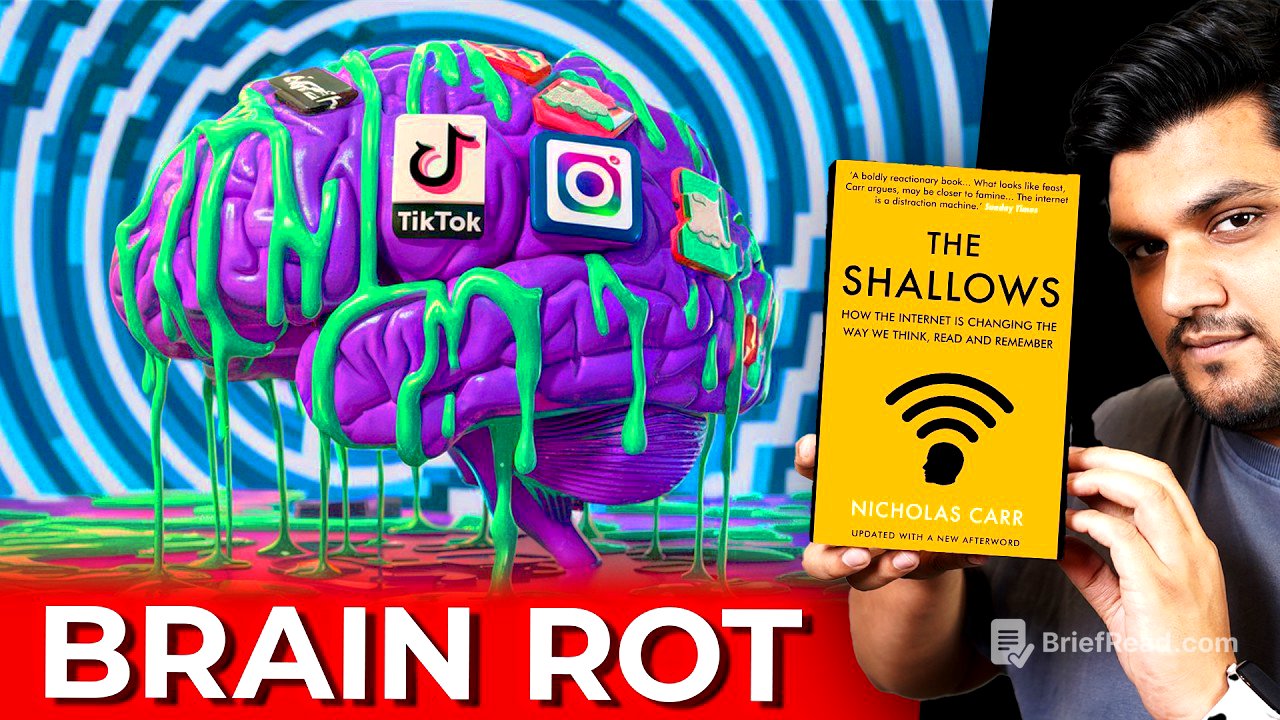TLDR;
This video discusses the concept of "brain rot" - a term for the negative effects of excessive internet and social media use. The video uses a fictional workshop scenario to explain the problem, its consequences, and solutions. The key takeaways are:
- Brain rot is characterized by a constant need for instant gratification and a lack of deep focus, leading to a decline in cognitive abilities and meaningful connections.
- The video highlights the science behind brain rewiring and how excessive internet use can strengthen neural pathways for shallow thinking, while weakening those for deep focus.
- The video offers practical solutions to combat brain rot, including deep reading, creating internet-free zones, mindful use of notifications, embracing slow knowledge, journaling, and becoming a creator.
- The video emphasizes the benefits of fighting brain rot, including enhanced creativity, deeper relationships, improved mental health, increased resilience, and boosted productivity.
Dangerous Disease has been found (Brain Rot) [0:00]
The video introduces the concept of "brain rot" as a serious issue affecting many people. It presents eight questions to help viewers identify if they are suffering from brain rot. The questions focus on excessive phone use, compulsive habits, and susceptibility to negative information. The video then highlights the prevalence of internet use and the amount of time wasted collectively due to excessive screen time.
Answer these 8 questions [0:28]
The video presents eight questions to help viewers identify if they are suffering from brain rot. The questions focus on excessive phone use, compulsive habits, and susceptibility to negative information.
Congratulations you too have Brain Rot Issue. [1:00]
The video emphasizes that if viewers answered "yes" to several of the questions, they might be suffering from brain rot. It highlights the prevalence of internet use and the amount of time wasted collectively due to excessive screen time.
Story of A girl [3:09]
The video introduces a fictional character, Disha, who encounters a post on Instagram that makes her realize she is wasting her time and potential. She then comes across a video about a workshop on brain rot, led by "Doctor Book," who will teach concepts from the book "Shallows." Disha decides to attend the workshop to learn about brain rot and its solutions.
Thinks to join workshop [3:59]
Disha, after realizing the negative impact of her internet use, decides to attend the workshop led by "Doctor Book" to learn about brain rot and its solutions. She believes that attending the workshop will provide her with the key concepts from the book "Shallows" without having to read it.
What exactly is Brain rot ? [4:47]
The video explains that brain rot is a feeling of mental fuzziness and a loss of focus caused by excessive internet and social media use. It highlights the addictive nature of instant dopamine hits from these platforms, which lead to a lack of meaningful progress in life. The video uses the analogy of building a house to illustrate how these dopamine hits are meaningless compared to the satisfaction of completing a meaningful task.
Section one The problem [8:45]
The video discusses the problem of "skimming culture" prevalent in the internet era. It explains how we tend to consume information superficially, quickly moving from one thing to another, which weakens our ability to focus and think deeply. The video encourages viewers to try reading a book or a long article to experience this feeling of restlessness and the urge to skim.
Section two Tools of the mind [9:48]
The video discusses how Google has become a dominant tool for knowledge and thought in the digital era. It refers to Google as the "Church of Google," where we rely on it for everything, even the smallest things. However, the video argues that Google often prioritizes trending or relevant information, neglecting deeper and more meaningful content. It highlights how technology is shaping our thinking habits, comparing it to the impact of the clock, map, and printing press on previous generations.
Section three The Consequences [10:45]
The video explores the consequences of brain rot, focusing on the decline in meaningful connections and critical thinking. It uses an example of a comedy video where a man avoids a deep conversation with his friend, highlighting how we are becoming incapable of engaging in meaningful conversations. The video also mentions a study from Harvard University that emphasizes the importance of meaningful connections for happiness and longevity.
Section 4 why it’s not your fault [12:13]
The video explains that brain rot is not entirely our fault, as it is a result of neuroplasticity. It uses the analogy of gym workouts to illustrate how focusing on one muscle group strengthens it while weakening others. Similarly, excessive internet use strengthens the parts of our brain responsible for shallow thinking, while weakening those responsible for deep focus.
Section 5 The Search Memory [13:26]
The video discusses the concept of "search memory," where we rely on search engines for information instead of using our own memory. It explains how this reliance weakens our memory and understanding of how things work. The video highlights the shift from "knowing" to "searching" as a consequence of brain rot.
Section 6 The Solution - Reclaiming your mind [14:19]
The video presents solutions to combat brain rot, starting with deep reading. It encourages viewers to read books without distractions, focusing on one topic at a time. The video also emphasizes the importance of creating internet-free zones, turning off unnecessary notifications, embracing slow knowledge, journaling, and becoming a creator.
5 Benefits [17:47]
The video highlights five benefits of fighting brain rot: enhanced creativity, deeper relationships, improved mental health, increased resilience, and boosted productivity. It provides research findings and examples to support these benefits, emphasizing the importance of creativity in a world increasingly reliant on AI.
Free masterclass content creation link [22:16]
The video concludes by encouraging viewers to apply the solutions discussed and provides a link to a free masterclass on content creation. It emphasizes the importance of becoming a creator to combat brain rot and encourages viewers to register for the masterclass.









